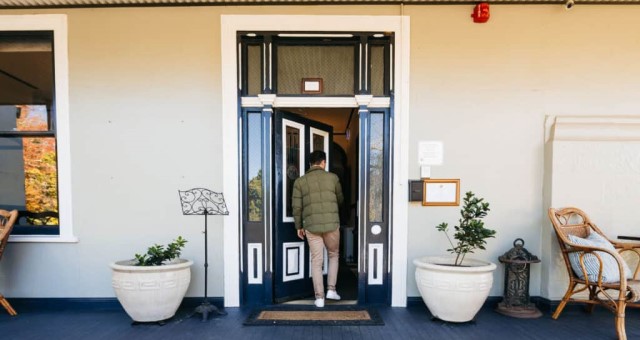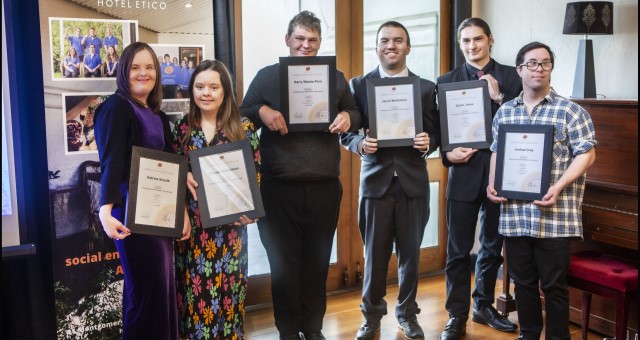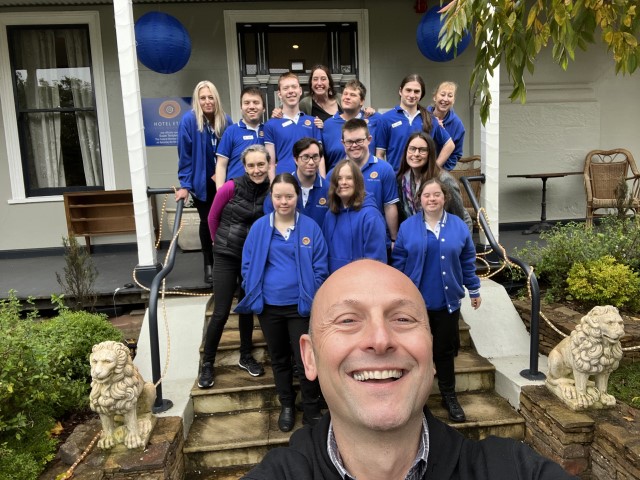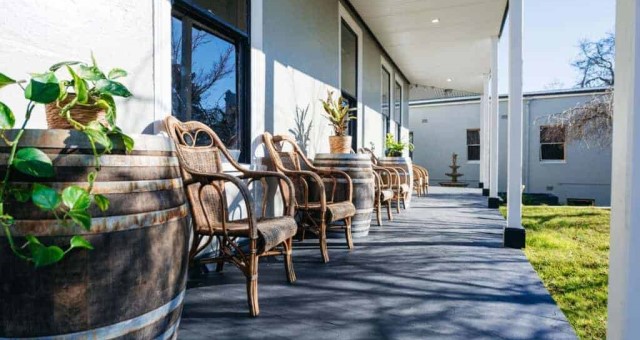Nestled in the welcoming village of Mount Victoria in New South Wales’ Blue Mountains lies an innovative hotel concept that could revolutionise disability employment in the hospitality industry.
Hotel Etico, Australia’s first social enterprise hotel, is a fully-functioning accommodation offering staffed by enthusiastic hospitality trainees with disability.
Born in Italy about a decade ago, the social enterprise model is focused on providing open employment for young people with disability, aged 18-35 years. More than that, it provides a pathway to a career in hospitality.
Led by Founder and Executive Director Andrea Comastri, Hotel Etico Australia opened its doors to the public in November 2020, before kicking off the first training program in February 2021.
Today, the hotel is supplying graduates to major industry partners including Sofitel Wentworth, Fairmont Resort Blue Mountains, The Fullerton Sydney, and Mercure Central, to name a few.
Three of its hotel partners are owned by Dr Jerry Schwartz, Director of Schwartz Family Company. Schwartz recognised the potential of Hotel Etico in providing valuable employment to people with disability and filling important positions in hotels.
“I was impressed with Hotel Etico’s goals, and with the hotel based in the Blue Mountains,” Schwartz told HM exclusively.
“I provided an introduction to our Fairmont Resort Blue Mountains’ General Manager, Ben Mellor, who immediately embraced the idea and gave four of their trainees the opportunity of work experience at the Fairmont.”
“It was a great success, and two of the trainees graduated into full-time roles, one as a concierge and another as an apprentice chef.”
After having such a positive experience, Mellor introduced the concept to other hotels within the Schwartz Family Company portfolio, resulting in Sofitel Sydney Darling Harbour and Mercure Sydney taking on graduates.
Mellor said he looks forward to developing the partnership.
“Creating inclusive work environments is critical to our business culture and helps us provide the best level of service to our customers,” he said.
“Hotel Etico is driving real value and impact in our communities, and we look forward to further developing our partnership as we continue to onboard and employ people with disabilities in ways that empower them to have meaningful and fulfilling careers at our sites.”
Disrupting disability employment
Despite Australia’s unemployment rate near record lows at 3.4%, it’s a different story for the 2.1 million people with disability of working age, Comastri explained.
“There’s only about 50% of people with disability that are employed – and those that are, are under employed or paid lower than award wage rates,” he told HM.
Disability employment has traditionally been dominated by workshops led by disability enterprises. Hotel Etico aims to disrupt this way of thinking by offering open employment with full award wages in which people with disability are fully integrated into the business – “front and center” in customer-facing roles.
“In our case, the model is unique because we see work as a means to an end – it’s a way to achieve independence in life,” Comastri said.
“We strongly believe that by having paid work, not only do you make money and therefore develop the ability to be more independent, but you also develop that sense of fulfillment and dignity, and inclusion in society.”
Schwartz believes the hospitality industry is “the perfect environment” for giving people with disabilities the chance to establish a sustainable career.
“Clearly, the industry has a long-term issue with attracting staff, and here we have a group of willing and motivated people wanting to establish a career in the industry,” he told HM.
“When there is a supportive environment, the trainees thrive and the wider hotel community benefits through their enthusiasm and desire to achieve.
“What we need are more managers like Ben who can see the potential of people with disabilities and engage with experts such as Andrea to translate potential into reality.”
At a time when the hospitality industry is struggling to secure skilled staff, Comastri, says the concept is a “win-win”.
“You’ve got lack of staff and you’ve got new and innovative ways of training people with disability in the hospitality sector – it’s a win-win situation,” he said.
Skills for life
A National Disability Insurance Scheme (NDIS) provider, Hotel Etico is currently geared towards those with intellectual disability, but the intention is to make the hotel fully accessible for participants and guests with physical disability too.
“It’s definitely a barrier that we want to address because we want to make sure that we are an accessible business as much as possible,” Comastri said.
The program provides participants with on-the-job training, working alongside hospitality professionals, with assistance from support workers where needed. There is also internal and external training provided in areas such as Responsible Service of Alcohol (RSA), safe food practice and barista service.
During their time at Hotel Etico, trainees work across all the different areas of the hotel business in 12-week blocks – from the kitchen to the restaurant and bar floor, housekeeping, and guest services.
Participants select an area in which to specialise for the last 12 weeks of the course and undertake work experience outside of the hotel with industry partners.
As well as gaining the skills to pursue a career in hospitality, participants also learn valuable life skills that support them to live independently. While living onsite, in shared accommodation known as the Academy of Independence, trainees also learn how to budget, how to do grocery shopping, and learn about healthy eating, healthy relationship practices and conflict resolution.
“We’re able to support them in developing independent living skills to live a more inclusive life,” Comastri said.
After placing graduates with a hotel partner, Hotel Etico continues to offer support to both the graduate and their employer. Comastri is also eager to secure funding to establish a comprehensive employer training program to educate human resources and management teams about supporting employees with disability.
“It’s a matter of trying and being open and seeing the value of diversity of all types,” he said.
“It’s an asset for any organisation. It makes a lot of business sense.”
Changing attitudes
Open Thursday though to Sunday, the tastefully renovated hotel is proving popular with guests, reporting 90-100% occupancy on Fridays and Saturdays.
Comastri says one of the most important ways Hotel Etico can create impact is by changing guests’ attitudes towards people with disability
“People like to stay because of the hotel and not necessarily because we’re a charity,” he said.
“We’re quite strong about that point. We don’t want people to come and stay with us because they feel that they need to do us a favour. It needs to be a good product.”
The feedback has been overwhelmingly positive, and guests are becoming ambassadors for the hotel, actively sharing their experience with others and online.
Scaling up
While it’s early days for Hotel Etico, and trainee numbers remain small, albeit doubling from the first intake of six to 12 in the second round, Comastri has big plans to expand.
“We are on a fairly ambitious path to scale up around the country,” he said.
“We want to be in every state and territory in Australia in the next 10 years. We’ve already started those conversations. Once we’ve got scale, we’re going to be able to service those partnerships better.”
Comastri’s advice for hoteliers?
“Be more inclusive. Be more open. Don’t be afraid.”




